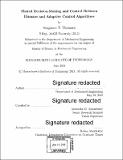Shared decision-making and control between humans and adaptive control algorithms
Author(s)
Thomsen, Benjamin T. (Benjamin Tian-You)
DownloadFull printable version (8.338Mb)
Other Contributors
Massachusetts Institute of Technology. Department of Mechanical Engineering.
Advisor
Anuradha M. Annaswamy.
Terms of use
Metadata
Show full item recordAbstract
This thesis addresses the problem of controlling a dynamical system subject to both parametric uncertainties and abrupt changes in the dynamic structure of the system, by proposing a shared control architecture predicated on a suitable division of responsibilities between supervisory human operators and adaptive control algorithms. Dynamical anomalies, such as the sudden introduction of unmodeled dynamics or time delays, present difficulties in control for both human operators and autonomous model-based control algorithms. Online adjustment to extenuate the effects of parametric uncertainty is possible through the proper use of adaptive control, and to a certain extent is paralleled by the learning of dynamics and adaptation of control policies by humans. Changes to the dynamic structure of the system, however, may lead to poor closed-loop performance and instability, regardless of whether the control input is determined by a human or adaptive control algorithm. The shared decision-making and control architecture introduced in this thesis tasks supervisory human operators with several high-level responsibilities in the mitigation of dynamical anomalies, and utilizes adaptive control algorithms for low-level control and command tracking duties. The shared controller is defined for dynamical systems where the full state is assumed to be measured as well as the case where only certain outputs are measured. The ability to respond to anomalies using this shared control architecture is demonstrated in several simulations of scenarios related to flight control, including the longitudinal control of an unmanned aerial vehicle whose actuator dynamics abruptly change from first-order to second-order, and the lateral-directional control of a fixed-wing aircraft subject to two anomalies concerning actuator dynamics and sensor dynamics. These simulations demonstrate how the division of responsibilities proposed in this thesis enables the recovery of closed-loop system stability and command tracking performance following the aforementioned anomalies.
Description
Thesis: S.M., Massachusetts Institute of Technology, Department of Mechanical Engineering, 2018. Cataloged from PDF version of thesis. Includes bibliographical references (pages 83-86).
Date issued
2018Department
Massachusetts Institute of Technology. Department of Mechanical EngineeringPublisher
Massachusetts Institute of Technology
Keywords
Mechanical Engineering.